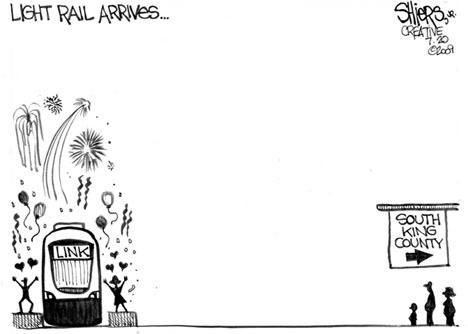The waiting, arguing and litigating is finally over.
Sound Transit inaugurated service last Saturday on the region’s first modern rapid transit system: Central Link, which runs from downtown Seattle to Tukwila. Under construction for more than six years, and planned for many more, light rail’s arrival heralds the beginning of new era for this region: an era in which we will develop a strong transit system to cut through gridlock and sprawl.
Because voters courageously and wisely decided last year to take a leap of faith and expand a system that hadn’t even opened yet, Link will soon be on its way to more neighborhoods. It’ll serve SeaTeac (at the end of this year), the University District (in 2016), as well as Northgate, Shoreline, Lynnwood, Mercer Island, Bellevue, Redmond, Des Moines, and Federal Way (within the next 15 years).
As the system builds out, it will give more and more commuters an alternative to driving, easing congestion and reducing travel times. This is possible because light rail runs in its own right of way, so it doesn’t get stuck in traffic. Even where Central Link has been built at-grade (in the Rainier Valley, for instance) it does not normally have to stop because it has priority at intersections.
Building rail is about the only thing we can do that will actually cure congestion. Expanding highways, as the Washington State Department of Transportation (WSDOT) is currently doing with I-405, does not work because it only encourages more people to drive. By adding new lanes, WSDOT is ironically creating the demand that they think they’re responding to. The money being wasted on that project would be better spent strengthening our ferry system, which is falling apart.
Voters seem to have realized that more highways are not the answer. In 2007, we turned down the Roads & Transit ballot measure, a product of the Legislature’s meddling. Lawmakers had decided late in the 2006 legislative session they wanted to force Sound Transit’s next proposition to the voters to be tied to a scheme to expand highways, and they passed legislation to that effect. The result was a mammoth ballot measure the following year that had something in it for almost everyone to dislike.
Voters saw it as too big and turned it down.
Surveys afterward revealed the Legislature’s error: By huge margins, voters expressed a preference for separate votes on highway and transit expansion. Armed with this feedback, Sound Transit went back to the ballot in 2008 alone, and voters gave the agency the green light.
So what can those of us on the Eastside expect when light rail reaches us a few years from now?
First, the ride will be smoother. Not as jerky as a bus, and certainly without the bouncing, making it easier to read, relax, or work on a netbook.
Second, it’ll be quicker. Link travels at high speeds with fast station stops. There’s no waiting outside of the bus for the people ahead to figure out how much change to drop in that farebox. Tickets are bought at the platform, not paid for inside the train.
Third, it will be more reliable. Light rail is versatile and has lower operating costs than buses (so over time, it does pay for itself). But it also means a reliable commute. No matter how backed up traffic is, travel times on light rail will stay the same. For riders of light rail, rush hour will no longer mean gridlock.
Fourth, it’ll be easier to ride. Our bus system can be very confusing. Link, on the other hand, has clear audio cues that announce what the next stop is (Now entering Westlake Station. Doors to my right) and scrolling LED boards with the same information. Plus, electronic signage at stations, which currently just displays the time, will soon be able to tell riders how far away the next train is.
Furthermore, Link trains are low floor, which means anyone in a wheelchair, pushing a stroller, or walking a bicycle can just roll aboard from the platform. There are no stairs to block the way.
The future of transportation in this region has arrived with Central Link. Light rail has the promise to make each of our lives easier — even to those who have no plans to use it.
Andrew Villeneuve is the founder and executive director of the Northwest Progressive Institute, a Redmond-based grassroots organization. Villeneuve can be reached at andrew@nwprogressive.org.


